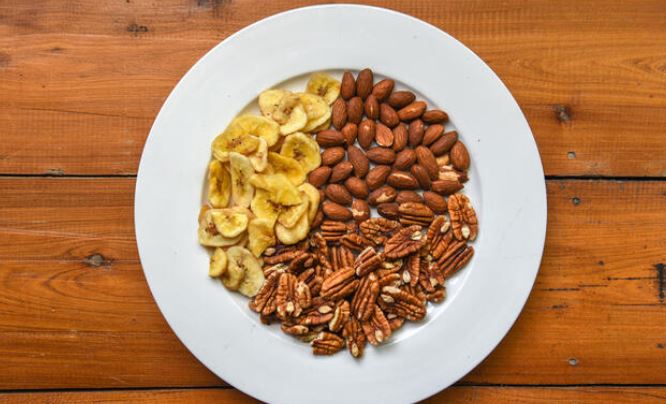To understand whether bananas are nuts or not, it is important to explain what nuts are. Nuts are a type of fruit with a hard, inedible outer shell and an edible seed inside. They are usually rich in nutrients such as protein, healthy fats, fiber, and vitamins.
Some common types of nuts include almonds, walnuts, pecans, and hazelnuts.
Now, let’s take a closer look at bananas.
Are Bananas Nuts or Fruits?
Bananas are a type of fruit that grows on trees in tropical regions. They have a soft, fleshy interior and thick, yellow skin that is often discarded. Bananas are an excellent source of nutrients, including potassium, vitamin C, and vitamin B6. They are also low in calories and high in fiber, making them a popular choice for those looking to maintain a healthy diet.
Bananas are not nuts. Bananas are fruits that are classified as berries.
Why Are Bananas Not Nuts?
So, why are bananas not nuts? There are a few reasons for this.
- First, bananas do not have a hard, inedible outer shell like most nuts. Instead, they have soft, easily peeled skin that can be eaten if desired.
- Second, bananas do not have an edible seed inside like most nuts. Instead, they have small, black seeds that are too hard to eat and are usually discarded.
- In addition to these physical differences, bananas, and nuts also differ in terms of their allergy risk.
While some people may be allergic to nuts, banana allergies are rare. Bananas are often recommended as a safe food for those with nut allergies, as they are not botanically related to nuts and do not contain the same proteins that can trigger an allergic reaction.
Despite these differences, bananas are often lumped together with nuts in popular culture. For example, you may have heard of “banana nut bread” or “banana nut muffins,” which are baked goods that contain both bananas and nuts. However, this does not mean that bananas are nuts or that they pose the same allergy risk.
Why Bananas are Mistaken to be Nuts
So, if bananas are not nuts, why do they sometimes confuse those with nut allergies? One reason is that some people with nut allergies may also be allergic to other foods, including; bananas. This is known as cross-reactivity, where the immune system mistakes one type of protein for another and produces an allergic reaction.
For example, some people with a birch pollen allergy may also be allergic to bananas, as they contain similar proteins. However, this type of allergy is not related to nut allergies and does not pose the same risk.
Another reason for the confusion is that bananas and nuts are often found together in foods and snacks. For example, many trail mixes and granola bars contain both bananas and nuts, and some restaurants may use the same utensils or cooking surfaces for both bananas and nuts, which can cause cross-contamination. If you have a nut allergy, it is important to read labels carefully and ask about ingredients when eating out to avoid any potential allergens.
Bananas are a type of fruit that is rich in nutrients and low in calories, with a soft, fleshy interior and thick, yellow skin. While bananas and nuts may be found together in some foods and snacks, they are not botanically related and do not pose the same allergy risk. If you have a nut allergy, it is crucial to be aware of cross-reactivity and to read labels carefully to avoid any potential allergens.
Overall, the confusion surrounding whether bananas are nuts is understandable, given the similar appearance and flavor of the two.

Can I eat Bananas with Nuts?
Yes, if you want to try a unique combination of foods, the bananas and nut choice is perfect. Both of the foods are packed with sufficient nutrients that your body requires. Bananas are soft and tasty while nuts are crunchy. So the two complement each other well and enhance satiation.
The following are the benefits of eating bananas with nuts;
1). Improves heart health
Nuts are a vital constituent of a healthy diet. They contain unsaturated fatty acids, fiber, plant sterols, and essential health nutrients. Research reveals that eating nuts frequently lowers the risk of inflammations associated with heart diseases.
Furthermore, nuts help to prevent blood clotting which may lead to strokes and dangerous heart diseases. Nuts are also good at lowering the level of unhealthy cholesterols in the body. Unhealthy cholesterol is a threat to the body since it can clog arteries. Generally, nuts reduce the risk of high blood pressure and thus prevent early death.
Bananas are likewise friendly to the heart. They contain sufficient potassium, a nutrient that aids in lowering blood pressure. Potassium helps in maintaining electrolyte balance in the blood. People with plenty of potassium in their body system rarely suffer from heart diseases or heart-related infections.
2). Provide the body with beneficial fiber.
Both bananas and nuts are rich in fiber. Fiber makes you feel satisfied faster and thus prevents overeating which would otherwise cause digestion problems. Fiber also prevents constipation and bloating.
Bananas and nuts also provide the body with proteins, vitamin B6, fats, calories, magnesium, manganese, and vitamin k. However, it should be noted that excessive consumption of nuts may be detrimental to your health. This is because nuts contain a lot of fats and proteins.

